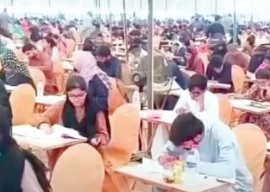
Workers’ rights: Women seek labour laws enforcement
The Chinese company has been given independent rights for berths number three and four at Port Qasim for 30 years on Build-Operate Transfer (Bot) basis and is handling the coal supply at the port for the Sahiwal Energy Project being run under another Chinese company - Huaneng Shandong Ruyi (Pakistan) Energy Pvt Ltd. Berths are a ship's allotted space at ports.
One of the protesting workers, 55-year-old Muhammad Rafiq, hasn't been home since the start of the protest. His two sons present at the camp were trying to convince their father to go home and take some rest. "His blood pressure is high. He needs rest," said his younger son, visibly perturbed. "Abba [father] hasn't gotten his salary for the past nine months. It's difficult to make ends meet at home and he's sitting here at the protest," he added. Rafiq was one of the first ship loaders at Port Qasim when it started its operations in 1981. He vividly remembers when the first ship anchored at the port in the month of November back then, when the area was nothing but a wilderness.
Most of the workers at the PQA are from tribal areas of Khyber-Pakhtunkhwa. "We habituated the port," Rafiq said sitting on a charpoy leaning against the footpath. When at work, he nonchalantly said, they don't eat a proper meal for days. "We have lost our fellow workers at the port due to non-availability of safety gadgets," he said, adding that after devoting their entire lives to the ports they own it more than anyone else. "How can they just ask us to leave?"
Rafiq is not the only worker whose livelihood is at stake. As many as 1,757 dock workers of the PQA are suffering because of weak workers' legislation, according to PQA labour union's Collective Bargaining Agreement (CBA) General Secretary Hussain Badshah.
Background
Travails of dock workers at ports aren't new. This terminology emerged in London in the 18th century, when around 65,000 dock workers protested for their rights. "Earlier, the dock workers used to get work on pick and choose basis," said Badshah, adding that when a ship used to anchor at the port, the company used to pick few of the dock workers for loading and unloading goods. He explained that the rest of the workers used to suffer from unemployment.
Then there came a rolling system mechanism, according to which every worker would get the work turn wise and the port would pay them all a fixed amount monthly and overtime if any. "This also safeguarded their health and other allowances," he said.
This Dock Workers Act was then adopted in India in 1934 and in Pakistan in 1948. The act was further amended in 1973 through an ordinance, Dock Workers [Regulation of Employment] Scheme. In 1974, it became an Act, which the Karachi Port Trust (KPT) adopted.
Under this Act, for the welfare of dock labour, the Karachi Dock Labour Board (KDLB) was constituted whose chairperson is also the KPT chairperson. The board, according to Badshah, is only functional in KPT, while the PQA, which started operations in 1981, never adopted the Dock Workers' Act or the KDLB.
An executive officer of KDLB, Ahmed Shehzad, explained to The Express Tribune that their board provides services to KPT and charges them under cess tax. For every container at the port, he explained, the KPT pays their board some percentage, while the companies such as of stevedore and shipping agents also pay them a certain amount and they provide them with the labour that includes dock workers.
With this, he explained, the minimum fixed wage of every worker is Rs18,000 and they also pay for their welfare. "We pay the workers on behalf of KPT," he explained and added that the PQA workers were not under their jurisdiction and hence, since the inception of the PQA, they faced problems.
At PQA
The PQA, according to Badshah, has sold berths to private companies, such as Qasim International Container Terminal (QICT), Fauji Akbar Portia (FAP) Marine Terminals and Pakistan International Bulk Terminal (PITB). "These companies abide by the Docker Workers' Act when they operate at KPT," he said adding that at the PQA, they have been given exclusive rights to handle the containers by the PQA on Bot-basis.
The QICT hired a private contractor to load and offload goods, which hires cheap and inexperienced labour from the market. The FAP also brought in its own workers a few years back, and the dockworkers who had gathered to protest against the move were subjected to a brutal baton charge by law enforcement agencies.
The real problem, he said, arose when the Chinese cargo handling company, M/S Hauaneng Fuyun Port and Shipping (Pvt) Ltd, was given berths number three and four at Port Qasim in 2016 by former Pakistan Muslim League -Nawaz ports and shipping minister Kamran Michael.
After reservations from the worker's union and a protest at the National Highway and the Port Qasim road, a memorandum for the provision of work at berths number three and four of Port Qasim was signed on October 23, 2017, between the Chinese company and the workers' union. According to the agreement, the Chinese company would work for 30 years on the Bot model and the company agreed to hire the labour from the labour union to work on berths number three and four. "If there will be a need for more workers at these berths or for a need to replace any worker, the required workers or replacements will be firstly taken from existing 1,751 dock workers working at Port Qasim," the memorandum reads.
The labourer started working for the company in July 2017. However, one of the employees of the company, on the condition of anonymity, told The Express Tribune that the Chinese company used to hold payments of dock workers and in July 2018, they simply asked them to leave. After this, Badshah said, they went to the labour court and obtained a stay order. "In return, our salaries were completely halted," he said.
Gwadar must get all facilities for competitive edge in region: minister
According to the company's employee, the management wants to hire less paid workers because the labour unions are demanding their allowances, which the management does not want to pay.
Political apathy
The incumbent minister for Maritime Affairs - formally known as Minister of Ports and Shipping- Pakistan Tehreek-e-Insaf's Ali Haider Zaidi visited their sit-in in 2016 against the PQA and the Chinese company. Prime Minister Imran Khan, Badshah said, addressed the sit-in on telephone back then. Up till now, he said, only PTI's elected MPA from Sindh Assembly, Shahnawaz Jadoon, had visited their camp and assured to resolve their issues. PQA Chairperson Asad Rafi Chandna did not respond to the repeated phone calls for a comment by The Express Tribune.
Published in The Express Tribune, October 20th, 2018.
1730464111-0/raygun-(1)1730464111-0-405x300.webp)
1730967569-0/BeFunky-collage-(28)1730967569-0-165x106.webp)
1730967164-0/trump-(21)1730967164-0-165x106.webp)
1730965998-0/BeFunky-collage-(27)1730965998-0-165x106.webp)
1730965430-0/trump-(20)1730965430-0-165x106.webp)












COMMENTS
Comments are moderated and generally will be posted if they are on-topic and not abusive.
For more information, please see our Comments FAQ